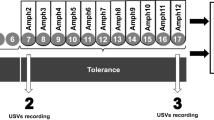Abstract.
Rationale: The study of the effects of repeated amphetamine administration and withdrawal on brain reward function has relevance to both amphetamine dependence and non-drug-induced depressions. Objectives: The purpose of this study was to investigate the effects of continuous amphetamine administration and withdrawal on brain stimulation reward thresholds, and the changes that occur with repeated amphetamine exposures. Methods: Rats were prepared with bipolar electrodes in the lateral hypothalamus and trained in a discrete-trial reward threshold procedure. Then, rats underwent two separate periods of amphetamine administration via subcutaneous osmotic mini-pumps. Results: Continuous amphetamine administration was associated with lowering in brain reward thresholds and decreases in response latencies, while withdrawal was associated with threshold elevations. These effects changed with subsequent amphetamine administration and withdrawal. Conclusions: The results of this study indicated that with the amphetamine administration regime used here, rats developed increased sensitivity to the effects of acute amphetamine administration and tolerance to the effects of amphetamine withdrawal.
Similar content being viewed by others
Author information
Authors and Affiliations
Additional information
Electronic Publication
Rights and permissions
About this article
Cite this article
Paterson, N., Myers, C. & Markou, A. Effects of repeated withdrawal from continuous amphetamine administration on brain reward function in rats. Psychopharmacology 152, 440–446 (2000). https://doi.org/10.1007/s002130000559
Received:
Accepted:
Issue Date:
DOI: https://doi.org/10.1007/s002130000559




